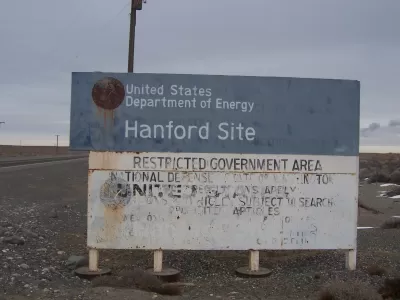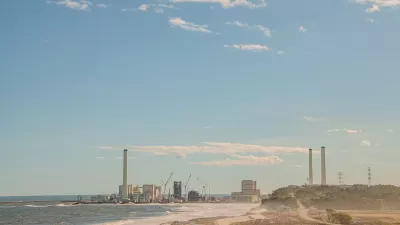A cleanup of nuclear weapons waste at Washington State's Hanford Site was first outlined in 1989. But now, as state officials wrangle with the federal government, deadlines set in 2016 may still not be met.

Washington's Hanford Site once played host to the Manhattan Project. Over the past several decades, it's been the site of one of the nation's largest nuclear cleanup efforts. But as Ralph Vartabedian reports, delays abound.
"Two multibillion-dollar industrial facilities intended to turn highly radioactive sludge into solid glass at the Hanford nuclear site have been essentially mothballed. Construction was halted in 2012 because of design flaws and Energy Department managers have foundered in finding alternatives," Vartabedian writes. Meanwhile, the storage of 56 million gallons of radioactive waste so close to the Columbia River has raised environmental concerns.
According to the state, "federal officials have taken repeated unilateral actions that will make their cleanup unlikely to meet critical deadlines set up in a 2016 consent decree in federal court." Part of that stems from cost issues. In February, a new estimate expanded the projects likely bill "from $110 billion to as much as $660 billion, a cost increase that has staggered Congress and has fueled sentiment to cut short the cleanup goals."
State officials are preparing for further legal wrangling to get the project back on track.
FULL STORY: Nation’s most ambitious project to clean up nuclear weapons waste has stalled at Hanford

Maui's Vacation Rental Debate Turns Ugly
Verbal attacks, misinformation campaigns and fistfights plague a high-stakes debate to convert thousands of vacation rentals into long-term housing.

Planetizen Federal Action Tracker
A weekly monitor of how Trump’s orders and actions are impacting planners and planning in America.

In Urban Planning, AI Prompting Could be the New Design Thinking
Creativity has long been key to great urban design. What if we see AI as our new creative partner?

King County Supportive Housing Program Offers Hope for Unhoused Residents
The county is taking a ‘Housing First’ approach that prioritizes getting people into housing, then offering wraparound supportive services.

Researchers Use AI to Get Clearer Picture of US Housing
Analysts are using artificial intelligence to supercharge their research by allowing them to comb through data faster. Though these AI tools can be error prone, they save time and housing researchers are optimistic about the future.

Making Shared Micromobility More Inclusive
Cities and shared mobility system operators can do more to include people with disabilities in planning and operations, per a new report.
Urban Design for Planners 1: Software Tools
This six-course series explores essential urban design concepts using open source software and equips planners with the tools they need to participate fully in the urban design process.
Planning for Universal Design
Learn the tools for implementing Universal Design in planning regulations.
planning NEXT
Appalachian Highlands Housing Partners
Mpact (founded as Rail~Volution)
City of Camden Redevelopment Agency
City of Astoria
City of Portland
City of Laramie



























